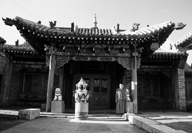Perpetual Motion
Perpetuum Mobile MONGOLIA / 2002 / Mongolian / Color / Video / 55 min
MONGOLIA / 2002 / Mongolian / Color / Video / 55 min
Director, Editing: Sakhya Byamba
Photography: Sakhya Byamba, B.Purevdorj
Sound: Sakhya Byamba, B.Purevdorj, L.Batdelger
Narrator: O.Ouyn
Production Company, Source: P.S Pictures
P.O-20, P.B-224, Ulaanbaatar 20 MONGOLIA
Phone: 976-11-352997
E-mail: sbyamba@magicnet.mn
A temple in the suburbs of Ulaanbaatar is home to young orphan girls. A railway track runs near by. Far away, auburn hills loom. The girls help with religious ceremonies, read books, study English and skip rope. The temple is saturated with a parched tranquility. Like a temporary station, the only references to the outside world are the sounds of an occasional train passing and radio commentary about the economic imperialism of foreign corporations. A philosophical poem that quotes Matsuo Basho, Kobayashi Issa and Ryokan.
[Director’s Statement] We used to think about ourselves as great creators. We used to estimate the meaning of our life and happiness by the amount of wealth which we created or collected. But the absolute meaning of life is measured and assessed only by time. All our creations and discoveries, all our gleams and comprehensions are nothing compared with the endless time and space in which we have lived. Values in society, our way of thinking and goals have always changed according to the time period. Only human hope, belief and love keep their absolute meaning in this infinite transformation. So maybe, not to lose them—that is the way to realize the meaning of our existence and to attain happiness.
Perpetual Motion was shot when Mongolian society was in transition to democracy and a market economy. Actually, this small monastery situated at a strange intersection of time and space could be a micro model of our society in this period of change.
After the collapse of the communist regime that lasted for seventy years, Mongolians were eager to bring back their historical and cultural heritage and rediscover national identity. But we realize the necessity of looking forward to the future, not only restoring our past. Existence in the two controversial spaces of future and past is not easy. That is why we have learned our old traditional Mongolian script along with English, and have restored monasteries that were destroyed, while at the same time building a new economic system.
Our past and future form our present . . .
 Sakhya Byamba
Sakhya ByambaBorn in 1962 in Ulaanbaatar, Mongolia. Studied mathematics at the State University of Irkutsk, Russia. Between 1983 and 1990 worked as camera assistant at the Mongol Kino studio and then joined the faculty of cinematography at Russia’s Film Institute VGIK (All-Russian State Institute of Cinematography) and completed his studies in 1996. His graduate film Umbilical Cord was shown at various international film festivals. Worked as a cinematographer on State of Dogs, screened at YIDFF ’99, and Real Men Eat Meat. Co-directed Poets of Mongolia with Peter Brosens and Peter Kruger and won the Mongolian Award for Best Documentary in 1999. Won a fellowship grant from the Akademie Schloss Solitude (Stuttgart) in 2000. Currently lives and works as a freelance cinematographer and independent director in Ulaanbaatar. |
|
• New Asian Currents | Sand and Water | Wellspring | Three-Five People | Homesick | The Circle’s Corner | The Maze of Lanes | Nee Engey—Where Are You | NEW (IMPROVED) DELHI—Director’s Cut | A Night of Prophecy | 150 Seconds Ago | The Ballad of Life | Noah’s Ark | The Old Man of Hara | Dandelion | Hibakusha—At the End of the World | 3rd Vol.2—2 Light House | And Thereafter | Dust Buries Sabuk | Family Project: House of a Father | Edit | Gina Kim’s Video Diary | Ordo | Her and Him Van Leo | The Big Durian | Perpetual Motion | Debris | Hard Good Life | Nail | The Rhythm in Wulu Village | A Short Journey • Jurors | Kim Dong-won | Kawase Naomi • New Asian Currents Special | Part 1 | Part 2 |
